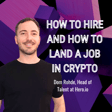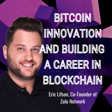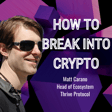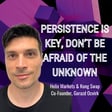Become a Creator today!Start creating today - Share your story with the world!
Start for free
00:00:00
00:00:01

Confirmo's CEO, Anna Strebl, How Stablecoins Are Redefining Global Payments
In this episode of Unveiling Tech, we sit down with Anna Strebl, CEO of Confirmo, a stablecoin-first payments platform powering the future of stablecoin transactions. Anna shares her journey from the UK government to becoming a fintech CEO, breaks down how stablecoins transform global payments, and reveals what it really takes to lead a fast-growing fintech startup. Whether you’re into blockchain, AI, or digital finance, this episode is your crash course in the next evolution of money and how to land a job in the industry.
Transcript
Anna Strable's Transition to Crypto
00:00:01
Speaker
Anna, welcome to the show. How are you? Hi, Jack. Thank you for having me. Yeah, no problems. Anna, for people who don't know who you are, could you give us bit of an introduction, please?
00:00:13
Speaker
Yeah, sure. um My name is Anna Strable and I'm the CEO of Confermo. So I'm now fully dedicated to building digital payments rails and um but i haven't been in crypto for that long i started my career outside of crypto i was working for the british government for um working on foreign affairs and international business but um now for the past still four years fully in crypto nice that's quite the switch yeah nice why uh why crypto out of interest why the switch
00:00:51
Speaker
So ah honestly, I didn't want to go specifically into crypto. i just I was working for ah the British Ministry of International Trade and I wanted to go to some small startups. So it was rather that i saw huge potential in this industry and and and specifically Confirmo.
Understanding Confirmo and Stablecoins
00:01:10
Speaker
So I joined ah when the product was quite early. but Nice. you um Could you give us a bit of an intro into Confirmo and what you guys are building?
00:01:22
Speaker
Yeah, sure. So ah Confirmo is a B2B stablecoin first payments platform. So you can think about it like PayPal, but for crypto, mostly stablecoins.
00:01:35
Speaker
So we've been operating for over a decade um and we started only with Bitcoin. So for the first seven years, we had only Bitcoin and Litecoin payment rails.
00:01:47
Speaker
So we've really seen it all when it comes to crypto payments. And after look we were adding more cryptocurrencies and in the past year, we see that stable coins are where we really see the biggest potential now with crypto payments.
00:02:06
Speaker
Sure. Obviously that word stable coins been cropping up a lot and more and more and more, uh, really over the last few months and, and, and way before then people listening, could you give us a crash course on this magical thing of a stable coin?
00:02:21
Speaker
Like, what is it? Can you, can you talk us through it? Yeah. So, um, maybe a bit of more context on stable coins. So Initially, it was supposed to be Bitcoin with the promise of being the new digital money.
00:02:37
Speaker
And that's also why Confirmo had only Bitcoin for many years.
Limitations of Bitcoin and Benefits of Stablecoins
00:02:41
Speaker
and But we saw that and while ah there was real demand for some alternative to the legacy payments that were really slow and they're just ah dependent on banking holidays and signatures, ah we needed some quick cross-border payments, fast Um, but Bitcoin, there was always the issue with volatility for the merchants.
00:03:06
Speaker
Also, there were high network fees. Um, it was re relatively slow, the transactions. So we were experimenting with different technologies. So there was a, for a long time, a promise of Bitcoin lightning, which is the off chain alternative of Bitcoin.
00:03:22
Speaker
So we thought that might be the technology because, uh, Bitcoin lightning really solves the speed issue. It's extremely fast and it's almost free.
00:03:35
Speaker
So that seemed very promising, but then the volatility remained, but mostly it was an issue of adoption for the end customers. So we just saw that people are not using it.
00:03:47
Speaker
So ah we added four years ago, stable coins, and we saw not only a surge of interest from the customers, but also we could target new verticals because and for financial services, stablecoins were exactly what they needed.
Stablecoins and the Future of Payments
00:04:04
Speaker
So stablecoins are in fact, and they're programmable money. So they connect all the good things about crypto, which is they're open, they're borderless, they're fast, ah but they are not you know not affected by the volatility. So they're directly tied to the fiat currencies. So they would be most commonly packed to a dollar one to one.
00:04:28
Speaker
um And it seems like that's finally the the real money for the digital age. Nice. And are stablecoins important?
00:04:41
Speaker
They're um important because you know there's just like so many perspectives from which you can look at stablecoins. but and Right now, the whole payment system is very obsolete. So the current payment system is not set for the digital age where we are right now. And the credit card fees are very high.
00:05:04
Speaker
So for example, in Europe, this whole market is regulated. So the credit card fees wouldn't be that high, but especially in the US s credit card fees would be on average 2%, 3%. And and If you look at, so one lens, how you can look at it is ah big companies like let's say Walmart.
00:05:23
Speaker
If um you have, if you have a revenue I don't most maybe 700 million, a billion dollars, and then you have 15 billion profit and you pay 2% on credit card fees. So that's like $6 billion you pay on credit card fees. So suddenly your profit can increase by, i don't know, like 40%.
00:05:44
Speaker
just if you switch to different payment drills. So that's one very simple lens how you can look at it. Then another one is if, for at least for this big company's credit card, they offer a lot of extra services, so chargebacks and fraud protection, that is useful.
00:06:03
Speaker
So at least they can use some of those extra services. But then if you look at, for example, some small coffee shop, Uh, where they would pay these 2% from every single transaction, but basically the transaction is just somebody hands you coffee over the counter and you just pay them. And there's no reason why the and merchant should, uh, they'd be 2% reduced from the price because they are not using any of the extra services, uh, on the credit card. So there's big potential of usage for both small and big companies.
00:06:38
Speaker
Um, but. I think what is also underappreciated is now how the U.S. government started looking at stablecoins and they started using stablecoins as an export for U.S. dollar.
00:06:54
Speaker
And I'm still surprised how much under radar this is. So obviously in
Integrating Web2 with Stablecoins
00:06:59
Speaker
my bubble, everybody knows about it. But I would say general public, even educated one, is still not paying that much attention to it.
00:07:08
Speaker
ah it's where Where can someone go to like find out what's happening in the stablecoin world? Is there a particular place that you go to get your word news from? Is it just from like digging around, just from like friends of friends?
00:07:19
Speaker
Hey, like look at this, and you kind of send each other stuff. like Where do you go? So, you know, in my world, it's kind of everywhere, right? So I don't even have a specific places where I go for this news. I have some standard, and you know, you're you're looking at some standard crypto news channels, but for example,
00:07:38
Speaker
for us, it's very crucial to be watching the US administration. So that's just something what you see is like, you know, the US s Treasury Secretary would be openly saying that they want to use stablecoins to push um US dollar to remain ah the um the main currency, ah to remain reserve currency.
00:07:59
Speaker
And you see, for example, that now stablecoin issuers are major buyer of US debt. So I think right now it's if stablecoin issuers were ah country, they would be the 14th largest owner of US debt. So it's a huge number and it's rising drastically um every year.
00:08:23
Speaker
So do US government right now, they have direct incentive to support stablecoins and they're very open about it. So oh whenever, you know, single stablecoin is issued,
00:08:34
Speaker
backed by dollar, there's more demand for buying the US debt. um And at the same time, it supports the dollarization the world economy. So it's even in the EU, they were talking about being afraid of the dollarization the EU through stablecoins.
00:08:54
Speaker
Wow. Okay. Nice. It's definitely definitely an area that people need to pay attention to because it's going to be changing ah all of our lives a lot by the side of it over the next few years. um ah I guess a big part of your role at Confirmo is to try to bring Web2 companies ah into the world of all things stablecoins and crypto, right? like You create those payment rails, you then bring companies in to start like accepting those as or implementing those payment rails into those businesses.
00:09:24
Speaker
um How do you get Web2
Growth of Confirmo and Stablecoin Adoption
00:09:26
Speaker
companies interested in the idea of stables? That sounds like quite a difficult task.
00:09:35
Speaker
So when we, well, when I started and we had only Bitcoin and Litecoin, i think there was a bit of a loss of a proper product market fit for the crypto payments industry.
00:09:47
Speaker
So it was difficult because I was just approaching bit random companies and trying to convince them that, uh, payments with Bitcoin will ah make their lives easier, but it was.
00:10:01
Speaker
It was not great time for the business from the perspective of the customers who were paying. They have a very specific reason why they were paying. And it was not always because we would be solving some problem.
00:10:15
Speaker
So it would be either because they were um some hardcore Bitcoiners and they just for, you know, their own, it just didn't believe in fiat currencies. So they just didn't want to exchange it. So that's why they needed a way how to pay with it, which It's a legit use case, but it's not a use case you can build a huge business on. Not scalable.
00:10:39
Speaker
Exactly. It's not very scalable. um So there were many clear use cases for this. ah So it was only when stablecoins came when we could properly target financial services, so for example. So that would be prop trading firms and forex brokers and For those businesses, that was a huge problem solver suddenly, because those are online platforms who have, uh, traders all over the world who just need to quickly send money to their own account and they need to be quickly paid out.
00:11:16
Speaker
And then suddenly stable coins for that become great option. And it's to be fair, it's not only stable coins that are used in this platform. So we offer. all the other major cryptocurrencies, but stablecoins are, their dominance is increasing um every year. So we see that this is where the market is heading. and So suddenly with stablecoins, we were solving real issues.
00:11:40
Speaker
So now it's much easier to come to companies and tell them, look, like your transactions will be instant. They will be much cheaper.
00:11:50
Speaker
So now is whenever you have an online business, so basically our ICP is, um, is so like ideal customer profile as a company who has a product, which is money and who transacts online.
00:12:04
Speaker
So it's very simple, but whenever you transact online in your, your business is money, then stable coins are solving a lot of problems.
Challenges in the Crypto Industry
00:12:13
Speaker
I suppose over time as well, like with with the increase in regulation, with the US government, obviously talk about that and trying to like really push stablecoins, that then makes your life a little bit easier, I can imagine.
00:12:24
Speaker
You don't have to push so hard to convince companies to do it. The US government are doing that for you, ah hopefully. Yeah, yeah, yeah. No, it definitely made our life much easier.
00:12:36
Speaker
um Although i have to say the regulation is, that's such an incredible, role that you have to live in as a crypto company because we're European based company. So, ah we're applying for the pan European crypto regulations called Mika.
00:12:52
Speaker
Um, and, uh, at the same time, we're like our biggest market right now is middle East. So we're applying for regulation there, uh, for license there. And, uh, us is our biggest target right now, because this is where there's huge potential and yes, the U S government is now supportive of the whole crypto industry and and specifically steve we're going so much nevertheless the the regulation and the time we have to spend on it is still immense so this is something i didn't expect for you know to be in a startup and to be spending so much time and resources on talking to regulators and making sure that you're always compliant
00:13:37
Speaker
can imagine that is, yeah, I can imagine that's a lot of work to stay ahead of the regulation, at least trying to stay up to date with what's going on. I was going to ask you actually about maybe about what are some of your biggest learned like maybe some of the challenges you necessarily didn't expect when you started or maybe some of your key learns from the last few years of like really trying to drive the adoption of stable coins regulation sounds like a huge one so far but are there any others that have really like stood out to you throughout that time yeah so yeah regulation is a big one then wonder
00:14:18
Speaker
wonder
00:14:26
Speaker
i think we're just like any other startup we struggle with the same things so oh we struggle with that you know everything from hiring people to scaling and platform maybe not catching up sometimes as quickly as we hope because we had a lot of growth that we experienced in the past years so i would say that the challenges with stable goings aren't not different against stablecoin business, not different probably than with any other startup.
00:15:02
Speaker
um If anything, I would say that it's a great industry to be because it's extremely growing industry.
Anna's Personal Journey in Crypto
00:15:12
Speaker
So for example, that would mean that, i don't know two years ago, the monthly business to business volume and stablecoins would be like hundred million dollars. And now it's like billions of dollars. So,
00:15:24
Speaker
It's growing so much, but it's relatively under the radar, whereas things like AI, there's huge hype. ah So being in this business, I think is really great.
00:15:35
Speaker
um Yeah. Nice. And then ah obviously coming from working with the the UK government or in the UK government to then come across to working for a startup in crypto, I can imagine the difference is huge.
00:15:53
Speaker
Is there anything for me from like a personal level from you, let's say if someone is coming into the crypto space from a more traditional ah place of work, anything you think people need to really be aware of before they make that jump that's really stood out to you?
00:16:09
Speaker
I think you really need to want this because that's entirely different world. So if you're somewhat happy in like a standard, maybe yeah even government, then switching is probably not a good idea because that that's entire, like everything is really different.
00:16:25
Speaker
Um, but, um, what I would say is that there's much more, you just get much more pleasure from doing this job because you're always accountable for, ah for what you do. Also when I was working for the government, while it was great and especially the UK government is, um, uh,
00:16:49
Speaker
I think it's probably one of the best governments to work for, to be honest. It's very much, you know, things are slow. You're constrained all the time. So even though you do business, that's, it's not, you know, a it's not real business that you're doing. It's a lot of um moving papers around.
00:17:11
Speaker
and So going to an actual business and building something. is probably a lot more stress, a lot less predictable, lot more risk.
00:17:24
Speaker
But um if this is what drives you, then it's definitely the right place where it to go. Yeah, that um that makes sense. Yeah, I suppose as a, yeah, coming from that that more traditional place of work into, you know, super um cutting edge startup and stuff like, yeah, that's going to be fairly, fairly different ah places to be.
Future of Stablecoins in Financial Services
00:17:49
Speaker
um Are there anything, just going back to stable coins for a second, is there any, and anything you can think people really overlooked
00:17:59
Speaker
when it comes to working with stables that you think like super, super important?
00:18:06
Speaker
I think it's, it's certainly, as I already mentioned it, so that's the potential that the whole industry has right now and how quickly I think the payment system will change.
00:18:18
Speaker
But I think at the end of the day, the end customer shouldn't, they did don't need to worry so much or they should even shouldn't probably know about it so much because I think the, the purpose or like the the goal of our payments companies should be making things as simple as possible for the end customer so i think we all know that apple pay is genius because you don't even know you're paying you're just clicking and everything just happens so this is how payment rails should work so ideally in the near future you will not know what runs on the underlying rails you know how the payment happens
00:18:53
Speaker
So whether it happens on Fiat Rails or whether it happens to stablecoins, the end customer shouldn't care. They shouldn't be affected at all. So the only effect it should on the end customer is that things should be cheaper um if you're sending money outside your own country. And so you're sending some cross-border payment.
00:19:12
Speaker
It should be automated as automatic as if you're sending an email. You shouldn't worry that it's more complicated. So things should just became ah become easier.
00:19:23
Speaker
easier and ah much more intuitive in the digital age so that's for the end customer but when it comes to the merchants they should see ah the difference in how because right now they're interacting with so many players when it comes to the payment rails it's very expensive as I mentioned it's very ah slow if you would have ah for example if you're an online business, I was before mentioning just kind of accepting money from your customers. But what is now very common is that you're in an online business and you have many contractors all over the world. stable coins and crypto in general is becoming extremely popular to pay out those contractors because um it's, you know, it's a very obvious sending a cross-border payment to one person in Mexico and one to Thailand.
00:20:19
Speaker
And if you have these contractors all over the world, then as a company, your life is very difficult for the contractor himself. It's usually difficult. to So, um the stable coin rails became now very popular for these businesses. So as a payroll as well.
00:20:35
Speaker
Yeah. And then, yeah. And maybe just wanted to add actually the use cases. There's so many of them. So, and then even for companies, so this intro company transfers. So if you're a company that has a one branch in Europe, one branch in America,
00:20:50
Speaker
on Biontonasia and you need to be shifting big sums of money between your own entities, then you're facing, again, the same problems, like the same cross-border payment problems. So using stablecoins just to transfer these your own company money um as a treasury ah basically is, again, a big use case for stablecoins right now.
00:21:14
Speaker
I suppose then you're not just
Entering the Crypto Industry
00:21:15
Speaker
wasting money on transfer fees, right? To send money to yourself that's already yours? Yes, exactly. And it's just so obvious to me, but we're living in a world where we're just used to paying so much for simple transfers.
00:21:30
Speaker
Yeah, that makes sense. That makes sense. um so Say if someone is super interested in in stables or even just crypto in general, I guess, um and they want to come and join the industry, they want to work for um ah tech projects that so such as yours, such as con Confirmo, um how can someone get into the industry?
00:21:54
Speaker
like How did you get your first job working in this space? you have any advice or tips there?
00:22:02
Speaker
I think it's really easy because now there's so many companies who are hiring, like Confirmo is hiring so much. So ah just look at the company that does something that resonates with you because you just need to be really, you just have to love the mission or it totally has to make sense to you.
00:22:19
Speaker
I don't think it's good to look for a job just in stablecoins in general because as in any other industries, there are many um there are many companies that do things that are maybe using a little bit of the hype that that there is around stablecoin. So I would really choose the companies that have a product that is solid and, and ideally that already has some traction, that has customers.
00:22:45
Speaker
Um, so, ah yeah, just find a project that makes sense to you. And then i think what's great about crypto is that. Practically anyone can learn it. It's, uh, it's, um,
00:23:00
Speaker
because there's so many aspects of the industry that goes beyond the technical side. It's now solving a lot of issues. There's now kind of the geopolitical context. That's really interesting.
00:23:13
Speaker
So I think anyone can learn it so that they can do the job very well. And we see it now so much people who are applying for jobs. They they're coming from big institutions, from banks.
00:23:26
Speaker
So it's very even often people who go for financial services, though they see that the industry is not working. So they want to get into the technology that is now solving a lot of the issues that the traditional financial world has.
00:23:40
Speaker
And, and with your, uh, with your role, uh, at Confirmo, did you see the CEO role like advertised online and you just applied for it and you, uh, spoke to the right people back then? Did you get kind of headhunted into that role? Are you able to kind of share if you remember, like how you.
00:23:58
Speaker
Yeah, and no. So yeah. So I, when I joined, it was literally just me and the founder. We had some external developers, but it was only me and him kind of fully working.
00:24:10
Speaker
Uh, on Confirmo because it was a side product of, um, a crypto exchange. So it wasn't even sold, um, the company. So I just joined it as a project that was not profitable. That was very small.
00:24:23
Speaker
Um, so it's just, so together with the founder, and we, yeah, we were working very hard. Uh, my job was to get, just, you know, get volume, basically get customers.
00:24:37
Speaker
So i joined more as a business development. ah person and ah and think I think it was after a year or so when they offered for me to transition to the CEO role because the founder, if you're in a crypto for a while, you get really tired because it's a lot of ups and downs and it's you're always fighting banking partners and like ah kind of the standard world.
00:25:03
Speaker
So he you know needed a well-deserved of um um break so yeah uh we agreed that i'll be the ceo nice and this might be quite a hard question to answer um could you give us a bit of a crash course on being a ceo i'm sure people a lot of people look at your role right and that would be their career aspiration you know they would love to be a ceo one day but then maybe From the outside looking in, it has quite a glamorous, like glamorous connotations to it, right? You're CEO of a cool emerging like ah tech startup or whatever the business might be. But what's it really like as a CEO? What do you need to do? Is there a bit of a crash course you could give us?
00:25:53
Speaker
um Honestly, I never thought I could be CEO. I was so surprised when they came with this proposition, the founder and the the investor.
00:26:04
Speaker
because I never saw myself. I just like this. I saw myself more as a business person, but in my head, CEO was someone, uh, for example, I felt like i like a lot of technical knowledge. Maybe I like some financial background. So I just literally found a CEO must be someone who has a much broader in-depth knowledge and many more areas than I have.
00:26:31
Speaker
Um, so I didn't feel confident, uh, to, take the position, but I took it and I see after only after that, I took it and honestly, I didn't know what to expect from it. And then I saw that, you know, CEO can mean so many things. Like there are so many different types of CEOs. So there are technical CEOs.
00:26:52
Speaker
I am definitely kind of business oriented CEO. um So I would just say, maybe not to assign to the role ah more meaning or like overly think that it it has to be someone so senior because it's ah basically you're you're a manager. You just have to be a really great generalist.
00:27:15
Speaker
I think you have to learn very fast. But what I also see is I think one of the most important things is you have the extremely resilient because there's so many issues you're dealing with every day. And I see that it's not,
00:27:30
Speaker
Not about, because I'm not the smartest person in the company. ah And so it's, I don't think it's about that. ah think it's just not being afraid and kind of being like, not look at all the issues that you're juggling all the time because not being overwhelmed, um just kind of as a bulldozer kind of only going forward all the time, not a worrying that things are not perfect, that you,
00:27:59
Speaker
like sometimes don't really understand even the things that you have to decide on. So you have to learn to trust your gut much more. so but I would, i think it's an amazing thing. It doesn't have to be a CEO position, but it could be like any type of senior position that I would encourage people to take, because I think you can do you
Leadership and Team Dynamics in Startups
00:28:20
Speaker
surprise yourself. You can do actually much better than you think maybe.
00:28:23
Speaker
Yeah. Yeah. I tend to agree. And I guess as part of that, you have to, If you're in a a senior position, you have to be able to bring in people around you that you really trust, right? Who, if you don't know the answer to absolutely everything, which you definitely, ah you're not going to, you know, you're only one person at the end of the You can't know the answer to absolutely everything. You then have to hire the right people into those positions to help you with that.
00:28:46
Speaker
Do you have any advice for people there? Like if you are trying to build a solid team around you, how do you even find the right talent? How do you even know who you need and who you don't?
00:28:58
Speaker
Yeah. So yeah, I've made so many mistakes in this regard. So now have we have really an amazing team of like 50 people and yeah we're hiring many more. and But I think first you what you have to make your piece with is that you just have to quickly change the people who are not working because you will just not know. So you will not find the perfect people.
00:29:22
Speaker
So so and What I learned was first, I was initially paying way too much attention to the CV. So it was sometimes overlooking some personal traits even, or maybe some gut feeling about the person because they had a great CV.
00:29:40
Speaker
And then I found out that it almost never worked for one or reason or other. And then, but on the other hand, when I had a great feeling about someone, but he didn't have ah the right experience, it usually was the right hire because people just can learn so much very quickly if they want to.
00:30:00
Speaker
So I learned that. And then it's, you know, it's it's such a well-known thing, but, you know, firing quickly as well is something that I think you'll learn afterwards as well, because if you have a feeling that it's not working, it's not fair for the other person either because usually the other person knows. Maybe you think, you know, they don't know that I'm not happy with them. Well, they, they know, they always know.
00:30:27
Speaker
So it's, you're just prolonging some toxic situation for both parties. So ah being decisive about changing the team, i think is good for everybody. It's good for the individual person. It's good for the team.
00:30:46
Speaker
And I wonder if there's something else. So yeah, I think those would be the main things. Yeah, yeah, yeah. i think I think you're right, especially on and letting people go earlier rather than kind of hanging on to people because you you know as a as a leader you want them to find a an environment where they really thrive right and like if it's not with you then you want them to move on and be able to find it so yeah I think you're completely right you're kind of giving them or doing them a bit of an injustice by keeping them in a position that you know that it's just not just not going to work um quite difficult to follow that advice I reckon when you're first building a team you kind of want to keep your people right I think
00:31:28
Speaker
You almost have to, no matter how many times people tell you to do it, I think you have to make that mistake yourself before you learn it to then do it. um And then our remember yeah what you find also is that even though you theoretically know this, you will get yourself into situations when implications of letting somebody go they're not only in a small company it's not only that you just start hiring again very very ah commonly it kind of like falls on you like all their ah responsibilities which has fallen me for example if I would let go with someone quite senior ah so you're also making the strategic decisions is it better for me to
00:32:12
Speaker
stay with this person for longer, even though it's not working? Or is it better if I just take over the work, but then I know it will affect many other areas, for example, the strategic ones where I should spend attention to. So um it's always not so straightforward, even ah that, you know, yes, I know, you know, like everybody like knows that you should let go people quickly, but then what's good for the company right now is also difficult to decide. That's a hard decision. That's quite a tough decision to make.
00:32:43
Speaker
if you have to choose between those two things. um Yeah, fair enough. No, no, that makes sense. I hadn't thought of that that side of it before, ah to to be honest, but that makes a lot of sense. Which side do you choose?
00:32:55
Speaker
You just have to pick one and... That's quite difficult there, right? Yeah, it's always a balance. So I think from... I usually tend to...
00:33:11
Speaker
I think the more senior person is, of course, there it gets complicated. So with junior people, it's not that much of an issue. But with the senior people, um I learned through a few experiences and that it's better to do it quicker.
00:33:27
Speaker
but yeah, there's not straightforward answer. ah But for example, I for a long time didn't even look how a proper org chart should look for in different stages of the organization. So it afterwards helped me to look at ah different org charts and different variations.
00:33:49
Speaker
So, ah you know, splitting people in ways that I didn't think of, splitting teams in ways I didn't think of. ah So you're now the first one who's dealing with ah this issue, definitely, if you come into an issue like this. So if you do, sometimes you can get trapped into thinking,
00:34:09
Speaker
that you have to figure it out and then you forget that.
Mentorship and Lifelong Learning
00:34:13
Speaker
just It's always good to like how ah somebody else try to solve the situation. And it's, I don't know, it's ah it's very common things like, yeah I don't know, you're missing a senior person, I don't know, in sales and then looking how you can structure it regionally or, um so yeah, all these questions somebody solved before.
00:34:36
Speaker
Yeah, for sure. Where as a as a CEO, again, I'm not sure if this is a difficult question to answer or not. But as a CEO, where do you go to learn that? Because I guess people in the business look to you for the answers sometimes, right? And that kind of stuff. Like, do you have mentors that you worked with in the past? Like, do you go out and find mentors?
00:34:56
Speaker
ah Were you lucky enough, obviously, to work alongside, as you said, the the the founder who knows experience in doing this kind of stuff already? Have got any advice there? Uh, so different things. so it's in different stages are different things that help. So they're all like, obviously I'm listening to podcast all the time. So you would have, um, some kind of staples that everybody should listen to like the hard thing about hard things and, uh, all these things, um, they're very useful for, ah leaders and building startups.
00:35:29
Speaker
Um, But then I also found, um, advisors. So I have now advisors. So it's always good to look for an advisor from an ideally, of course, from a company that you admire very much. So for example, X employees from that company. So I was lucky to, ah find someone from, um, uh, from a big company, uh, payments company. So that's helping me so much because also if you find someone from the companies that you
00:36:00
Speaker
um from the industries and the the companies that grew a lot, then they went through the same stages. So what's amazing is that even Stripe went through the same changes and the same ah ah evolution that we're going through right now as a payments company.
00:36:18
Speaker
So ah it's great to find someone from these big payments companies and learn from them. um And it does help me so much through many transitions that we had to make in the business.
00:36:32
Speaker
Nice. Yeah. Yeah. I think that's super important. um I think that's really important at all levels, to be honest, not just when you're in a leadership position where you can find advisors and you have that ability to kind of bring them on board. But I even think if you're at the start of your career,
00:36:48
Speaker
You know, you look for someone who's maybe, you know, level or two above where you are, like, I'd say a level or two above, but you what mean, terms like, job or experience-wise. Just, like, ask them their opinion, like, how did they get there, like, advice they can share, and then maybe later on your journey, find someone else who's in maybe another position that you are only a couple of steps away from that kind of thing.
00:37:08
Speaker
I think it's something that more people should do, but not many people do, really. But I think it can make a huge difference. Definitely. And then I would always focus on choosing the right advisor or mentor from the industries, like relevant industries, because I think that's so important. um Because even though there might be someone amazing whom you admire, i don't know, from and don't know Facebook or whatever, it will probably not be, their experience will be quite different from anll scaling the company than it would be from either a crypto company or payments company. So for example, for
00:37:44
Speaker
our experience, payments are even more relevant sometimes than crypto because at the end of the day, we're a payment rail. Even though it's a crypto payment rail, it's a payment rail.
00:37:55
Speaker
And we're targeting the same customers that payments companies are targeting. um So just being very mindful ah what it is that you need from those
Conclusion and Contact Information
00:38:07
Speaker
advisors. whether But then also it's about what you're looking for. You could be looking for just some purely leadership lessons so that's another thing uh but for example for me the industry insights uh were always crucial yeah that's good advice that's that's a good thing for people to understand for sure um well Anna over the last 40 minutes or so you've um you shared a lot with us I think you've given us a deep dive into this tables you've talked us through your journey shared some great advice
00:38:39
Speaker
Knowing what you know now about technology, about crypto, about ah stablecoins, leadership, ah and there are there any closing words you'd like to leave us with? Any final pieces of advice for people out there?
00:38:53
Speaker
I would just generally say it's such a great time to be alive in terms of technology. So I think one lifetime is not enough to explore all the things that now you can get into, whether it's AI longevity or crypto. So I think we're just extremely lucky when it comes to technology and all the things that we can do right now.
00:39:15
Speaker
Yeah, I think you're right. I think you're right. Well, Anna, thank you very much for taking the time to have a conversation ah today. If people are listening, they want to find out more about about you, and about Confirmo, where can they go? Is it better on on the direct company website? Is it LinkedIn? Is it Twitter?
00:39:33
Speaker
Where do you guys... So we're on on on Twitter. We're on LinkedIn. ah So you can easily contact us there. ah As I mentioned, we're hiring. So ah you can look at the positions we have opened as well.
00:39:48
Speaker
That was great. Glana, thanks again. Appreciate you taking the time. Really enjoyed the chat. and i And I'll hopefully catch you up with you soon. Thank you so much, Jack.



















